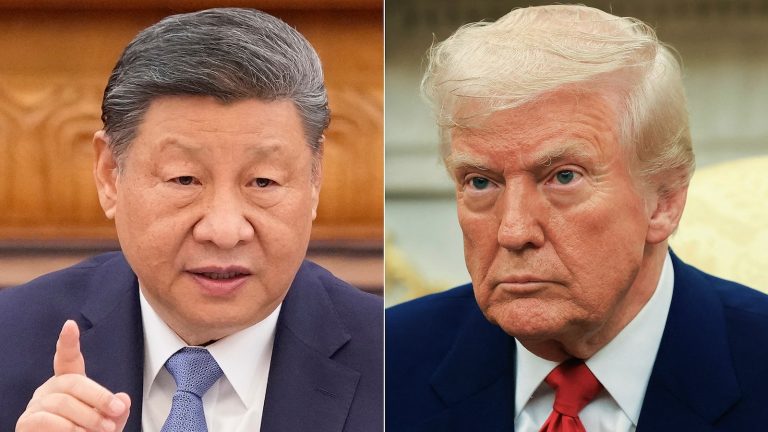Xi Jinping is playing hardball.
The Chinese president wants to show his people that the country can withstand the economic pain from President Donald Trump’s tariffs and stand up to what Beijing is calling America’s “bullying,” according to experts.
Trump’s trade war also feeds into the strategy that Xi has been working on for years: become less reliant on the United States.
This breakdown in trade is “exactly what Beijing has been preparing for,” said Jude Blanchette, director of the RAND China Research Center. “Beijing is not looking for negotiation.”
The world’s superpowers are engaged in a risky game of chicken, experts told ABC News. The question is who blinks first.

China’s President Xi Jinping in Beijing, March 28, 2025 and President Donald Trump, in Washington, April 7, 2025.
Getty Images/Reuters
“At the moment, Xi seems to be calculating that China can withstand the damage and that ultimately it’s the United States who will blink first,” said Neil Thomas, a fellow for Chinese politics at the Asia Society Policy Institute’s Center for China Analysis
Xi’s view is that countries will want to do business less with the U.S. because of the uncertainty created by tariffs, which will drive them toward China, said Thomas, who added that China has been preparing for this possibility for years by growing trade relations with the rest of the world.
“Both Washington and Beijing think they hold the stronger hand for different reasons. The Trump administration sees China as export-dependent, so they believe it’s significant leverage to get the Chinese to bend,” Blanchette said. “On the other hand, Beijing sees the U.S. as increasingly economically weak under Trump and distanced from its allies.”
While Trump in his Cabinet meeting on Thursday called Xi a “friend” and said he’d love to strike a deal with China, the calculus isn’t so simple for Xi. If Xi walks away from the phone call without a deal, he risks losing face.
“For Xi, there’s a huge amount of risk of looking weak in his dealings with the U.S. He risks being humiliated or not having anything to show for his engagement with Trump,” Thomas said. “The tariffs will be economically painful, but Xi also sees this as an opportunity to get China into a healthier situation by reducing reliance on the U.S.”
There are also other levers China can pull to retaliate. Experts say Beijing could ban more companies from doing business in China and further limit exports of critical materials, such as rare earth minerals.
China “hasn’t gone anywhere close to the maximum that it could do with its rare earth exports, considering it’s such a dominant player in the industry,” Thomas said.
China could “shut down huge segments of high-tech supply chains” by banning rare earth minerals, Thomas said, calling it “a nuclear option that would severely damage not just the American economy but European and Asian economies.”
Beijing has also said it will restrict Hollywood films in China. While it’s not a “significant” retaliation, Thomas said that “it feeds right into Xi Jinping’s broader political agenda to reduce foreign influence on Chinese society.”
But Scott Kenney, senior adviser and trustee chair in Chinese business and economics at the Center for Strategic and International Studies, argued that Beijing believes Trump has already blinked by pausing the reciprocal tariffs for 90 days.
“I think the Chinese will read this as weakness from President Trump and they will wait,” he said.



